1. Opportunity to Socialise
– Join walking clubs/groups. See WalkGPS links to bushwalking Club websites .
– Build a sense of community & friendship and a supportive network through shared, relaxed activity.
Quote
“The true charm of pedestrianism does not lie in the walking, or in the scenery, but in the talking. The walking is good to time the movement of the tongue by, and to keep the blood and the brain stirred up and active; the scenery and the woodsy smells are good to bear in upon a man an unconscious and unobtrusive charm and solace to eye and soul and sense; but the supreme pleasure comes from the talk.” – Mark Twain [Samuel Clemens] (1835–1910), American humorist, satirist, writer, lecturer; In A Tramp Abroad, Ch. 23 (1880).
2. Opportunity for Solitude, Time to reflect, or Meditate
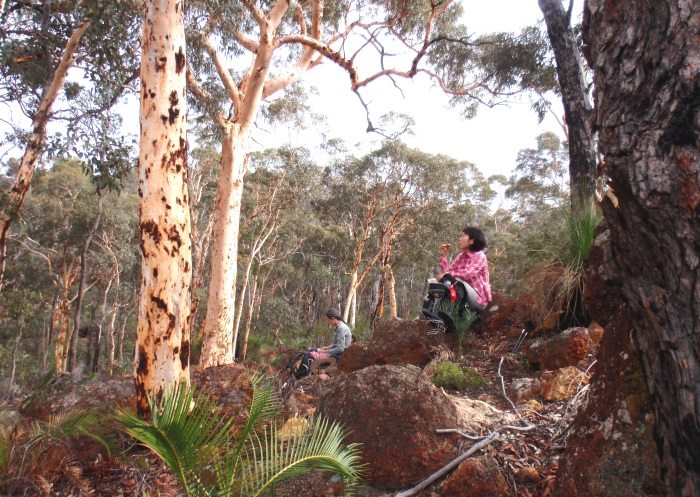
– Many walkers enjoy walking alone at least some of the time.
– A chance to ‘slow down’ and find yourself, to take time out, to find some space. Leave the mobile phone and iPod at home!
– Some walkers also practice Walking Meditation, initially focusing on a physical awareness of the body’s motion and rhythm and of the senses; experiencing the moment while freeing the mind of everyday thoughts and cares; allowing new thoughts to flow; achieving ‘mindfulness’ and a sense of contentment and fulfilment; a more ‘spiritual’ dimension of walking.
Quotes
“All truly great thoughts are conceived by walking.” – Friedrich Nietzsche (1844–1900), German philosopher
“I can only meditate when I am walking. When I stop, I cease to think; my mind works only with my legs.” – Jean-Jacques Rousseau (1712-1778), Genevan philosopher; from Les Confessions.
“To find new things, take the path you took yesterday.” – John Burroughs (1837-1921), American naturalist.
“Me thinks that the moment my legs begin to move, my thoughts begin to flow.”– Henry David Thoreau (1817–1862), U.S. philosopher, author, naturalist.
“The rhythm of walking generates a kind of rhythm of thinking, and the passage through a landscape echoes or stimulates the passage through a series of thoughts. This creates an odd consonance between internal and external passage, one that suggests that the mind is also a landscape of sorts and that walking is one way to traverse it. A new thought often seems like a feature of the landscape that was there all along, as though thinking were traveling rather than making.”– Rebecca Solnit, American writer, historian, environmental activist; from “Wanderlust: A History of Walking”, p. 5; 2000.
“I was the world in which I walked.” – Wallace Stevens (1879-1955), American modernist poet; from Tea at the Palaz of Hoon, in Collected Poetry & Prose, p.51.
“Solvitur ambulando” (Translation: “It is solved by walking.”) – Latin proverb
“Don’t underestimate the value of Doing Nothing, of just going along, listening to all the things you can’t hear, and not bothering.” – A.A. Milne (1882-1956), Pooh’s Little Instruction Book, publ. Methuen 1996.
“It is not talking but walking that will bring us to heaven.” – Matthew Henry(1662-1714), English non-conformist clergyman.
“Walking meditation means to enjoy walking without any intention to arrive. We don’t need to arrive anywhere. We just walk. We enjoy walking. ….. Usually in our daily life we walk because we want to go somewhere. Walking is only a means to an end, and that is why we do not enjoy every step we take. Walking meditation is different. Walking is only for walking. You enjoy every step you take. So this is a kind of revolution in walking. You allow yourself to enjoy every step you take.” – Thich Nhat Hanh (b. 1926), Vietnamese Zen Buddhist monk, teacher, author, peace activist; from Resting in the River.
“If you look for the truth outside yourself,
It gets farther and farther away.
Today walking alone, I meet it everywhere I step.
It is the same as me, yet I am not it.
Only if you understand it in this way
Will you merge with the way things are.”
– Tung-shan Liang-chieh (806-869), ancient Chinese Zen (Ch’an) master.
“On the path that leads to Nowhere I have sometimes found my soul!” – Corinne Roosevelt Robinson (1861-1933), poet, lecturer, orator. From the poem “The Path that leads to Nowhere” in The Poems of Corinne Roosevelt Robinson. New York: Charles Scribner’s Sons, 1921.
“One step at a time is good walking.” – Chinese Proverb
“Tranquility:
Walking alone;
Happy alone.”
– Masaoka Shiki (1867-1902), Japanese author, poet, critic; ‘Haiku’ poem.
“Nature is shy and noncommittal in a crowd. To learn her secrets, visit her alone or with a single friend, at most. Everything evades you, everything hides, even your thoughts escape you, when you walk in a crowd.” – Edwin Way Teale (1899-1980), American naturalist, photographer, writer; Circle of the Seasons: The Journal of a Naturalist’s Year – May 4. (1987).
3. Increased ‘Sense of Place’
Improve your knowledge of your local environment and feel a part of it.
Quotes
“The real voyage of discovery consists not in seeking new landscapes, but in having new eyes.” – Marcel Proust (1871-1922), French intellectual, novelist, essayist & critic.
Desertion
Where the track curves out of sight
between the fire-scarred jarrahs,
shadowy among the shadows but noisy
for the forest litter, kangaroos
are rising and retreating. An awe,
an ache, this glimpse. Proceeding,
I discover where they dozed beneath
the grasstrees. I feel their desertion.
I wonder if I should go on or go back.
Either way, who will give me welcome?
– © Andrew Lansdown (b. 1954-), West Australian poet; from Birds in Mind (Wombat Books, 2009). Visit andrewlansdown.com
“We shall not cease from exploration
And the end of all our exploring
Will be to arrive where we started
And know the place for the first time.”
– T. S. Eliot (1888-1965), American poet, dramatist, and literary critic; from Little Gidding.
“It is not enough to just “love nature” or want to “be in harmony with Gaia.” Our relation to the natural world takes place in a place, and it must be grounded in information and experience.” – Gary Snyder (b.1930), American poet, essayist, environmental activist.
“The country was all wrong and I felt cheated. This wasn’t what I had come back for; where were the ferntree gullies, the high plains, the trout? All the plants scratched your legs. The jarrah was a grotesque parody of a tree, gaunt, misshapen, usually with a few dead limbs, fire-blackened trunk, and barely enough leaves to shade a small ant. If you went camping in the summer, you carried water – you couldn’t take a running stream for granted. It was slowly borne in on me that I wasn’t an Australian at all, but a Victorian…. Slowly I came to understand the land better.” – George Seddon (1927-2007), Australian academic; writing of Western Australia in the Foreword to his “Sense of Place”; 1972.
“One of the most interesting anomalies in Australian environmentalism is that the alumina industry is destroying the jarrah forest – and nobody seems to care. At least, nobody is complaining. ” …… “…there will come a time in the not-too-distant future when West Australians realise what has gone on, and the extent and cost of the ecological damage which has occurred. Then perhaps they will look back on the government, agency and NGO-supported destruction of the jarrah forest by bauxite mining as one of the greatest conservation blunders in our history.” – Roger Underwood, former General Manager of W.A. Dept. of Conservation & Land Management (CALM); from blog post, 8 August, 2007. (See also Bauxite mining on WalkGPS.)
“There is nothing like walking to get the feel of a country. A fine landscape is like a piece of music; it must be taken at the right tempo. Even a bicycle goes too fast.” – Paul Scott Mowrer (1887-1971), U.S. newspaper correspondent; from The House of Europe; 1945.
“If a certain assemblage of trees, of mountains, of waters, and of houses that we call a landscape is beautiful, it is not because of itself, but through me, through my own indulgence, through the thought or the sentiment that I attach to it.” – Charles Baudelaire (1821-1867), French poet.
“If the day ever comes when they know who
They are, they may know better where they are.”
– Robert Frost (1874-1963), American poet; from A Cabin in the Clearing; 1951.
“The beauty of nature includes all that is called beautiful, as its flower, and all that is not called beautiful, as its stalk and roots. Indeed, when I go to the woods or the fields, or ascend to the hilltop, I do not seem to be gazing upon beauty at all, but to be breathing it like the air. I am not dazzled or astonished; I am in no hurry to look lest it be gone. I would not have the litter and debris removed, or at the bands trimmed, or the ground painted. What I enjoy is commensurate with the earth and sky itself. It clings to the rocks and trees; it is kindred to the roughness and savagery; it arises from every tangle and chasm; it perches on the dry oakstubs with the hawks and buzzards; the crows shed it from their wings and weave it in to their nests of coarse sticks; the fox barks it, the cattle low it, and every mountain path leads to its haunts. I am not a spectator of, but a participator in it. It is not an adornment; its roots strike to the centre of the earth.” – John Burroughs (1837-1921), American naturalist; from Birds and Poets, 1877.
“I thought how sadly beauty of inscape was unknown and buried away from simple people and yet how near at hand it was if they had eyes to see it and it could be called out everywhere again.” – Gerard Manley Hopkins (1844-1899), British poet, Jesuit priest; from Journal, July 19, 1872.
4. Experience the outdoors
Away from the internet and sedentary lifestyle diseases. Stimulate the senses and perhaps help the kids discover nature. (See also The Sandgropers blog-Bushwalks for family inspiration.) Discover also that a place need not be “stunning”, “splendid”, “spectacular”, “breathtaking” or “iconic” to reward the walker (and the family) with a ‘great’ walk! Also see “Why Bushwalk?”.
Quotes
“Go outside and walk a bit, long enough to take in and record new surroundings. Enjoy the best-kept secret around – the ordinary, everyday landscape that touches any explorer with magic.” – John R. Stilgoe, Outside Lies Magic: Regaining History and Awareness in Everyday Places, 1998.
Tanka
for Naomi, aged three
‘Do Kookeeburras
eat cookies?’ she asks. The bird
laughs again, rattling
it out. We are bushwalking.
She holds my hand, my heart.
– © Andrew Lansdown (b. 1954-), West Australian poet; from The Grasshopper Heart (Collins/Angus & Robertson, 1991). Visit andrewlansdown.com
“Bad weather always looks worse through a window.” – Tom Lehrer (1928-), American singer, satirical songwriter, mathematician.
5. Work-Life balance
Walking is a natural and gentle discipline – while exercising the body it also slows us down and takes us out of the ‘fast lane’ for a while. While it may not provide the level of excitement and technical and physical challenges of modern competitive sports and many other recreational activities, it does offer the simplest and surest means of maintaining a balance in our increasingly frenetic modern lifestyles.
Quotes
“After a day’s walk everything has twice its usual value.” – G.M. Trevelyan (1876-1962), British historian.
“Above all, do not lose your desire to walk. Every day I walk myself into a state of well-being and walk away from every illness. I have walked myself into my best thoughts, and I know of no thought so burdensome that one cannot walk away from it.” – Soren Kierkegaard (1813-1855), Danish philosopher & theologian.
“There is more to life than increasing its speed.” – Mohandas [Mahatma] Gandhi (1869-1948), Indian political and spiritual leader.
“Walking takes longer… than any other known form of locomotion except crawling. Thus it stretches time and prolongs life. Life is already too short to waste on speed.” -Edward Abbey (1927-1989), American author & essayist; from The Journey Home; 1977.
“I stroll along serenely, with my eyes, my shoes, my rage, forgetting everything.” – Pablo Neruda [Ricardo Basoalto] (1904-1973); Chilean poet & politician; translated; from poem “Walking Around”.
 Regular walkers, including bushwalkers, need no convincing of the many quality-of-life benefits they obtain from the humble activity of walking.
Regular walkers, including bushwalkers, need no convincing of the many quality-of-life benefits they obtain from the humble activity of walking.

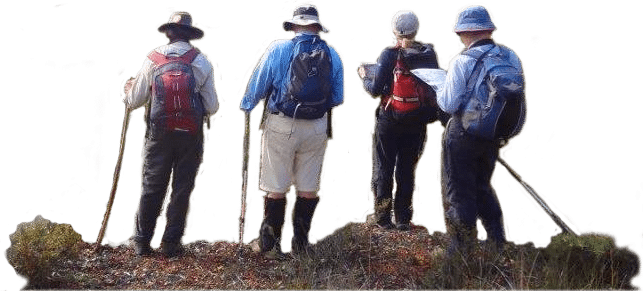 Or freedom from frustration? – For others those traditional navigational uncertainties become frustrations detracting from their enjoyment of a walk. Using GPS, these walkers can have confidence not only that subtle route markers won’t be missed, but that they can choose to wander freely; to explore away from their planned route, not keeping to a compass-bearing, but remaining able to easily navigate back to the known route at any time from wherever they may be. In that sense, GPS navigation offers both freedom and adventure. It is also ideal for walkers for whom solitude and relaxation in the forest is the priority, rather than pure adventure.
Or freedom from frustration? – For others those traditional navigational uncertainties become frustrations detracting from their enjoyment of a walk. Using GPS, these walkers can have confidence not only that subtle route markers won’t be missed, but that they can choose to wander freely; to explore away from their planned route, not keeping to a compass-bearing, but remaining able to easily navigate back to the known route at any time from wherever they may be. In that sense, GPS navigation offers both freedom and adventure. It is also ideal for walkers for whom solitude and relaxation in the forest is the priority, rather than pure adventure.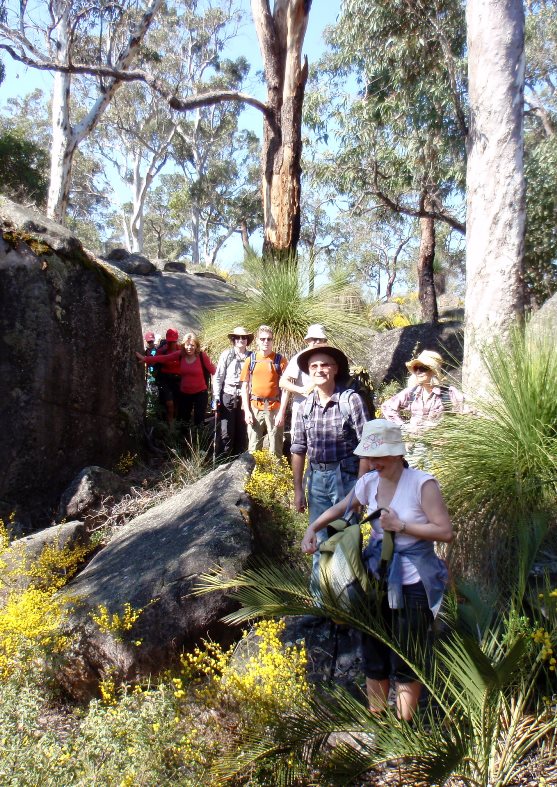 “..people were walking in the bush for pleasure long before the first club had ever been thought of, or before the first tourist track was ever laid ... bushwalking can be traced back to 1788.” – Melissa Harper (Australian researcher); from “The ways of the bushwalker: on foot in Australia”, 2007.
“..people were walking in the bush for pleasure long before the first club had ever been thought of, or before the first tourist track was ever laid ... bushwalking can be traced back to 1788.” – Melissa Harper (Australian researcher); from “The ways of the bushwalker: on foot in Australia”, 2007.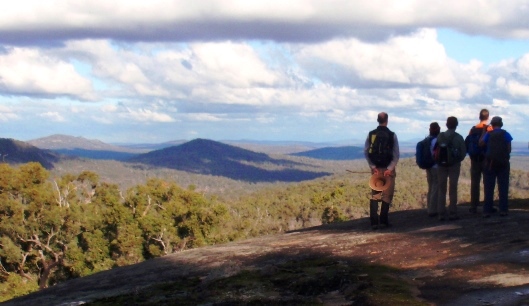 “Everybody needs beauty as well as bread, places to play in and places to pray in, where Nature may heal and cheer and give strength to body and soul alike.” – John Muir (1838-1914), Scottish-American wilderness preservationist & naturalist. “The Hetch Hetchy Valley” Sierra Club Bulletin, Vol. VI, No.4, Jan. 1908.
“Everybody needs beauty as well as bread, places to play in and places to pray in, where Nature may heal and cheer and give strength to body and soul alike.” – John Muir (1838-1914), Scottish-American wilderness preservationist & naturalist. “The Hetch Hetchy Valley” Sierra Club Bulletin, Vol. VI, No.4, Jan. 1908.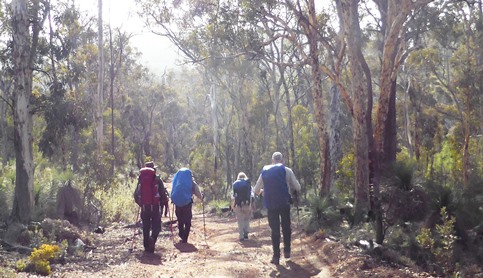 “Away, away, from men and towns,
“Away, away, from men and towns,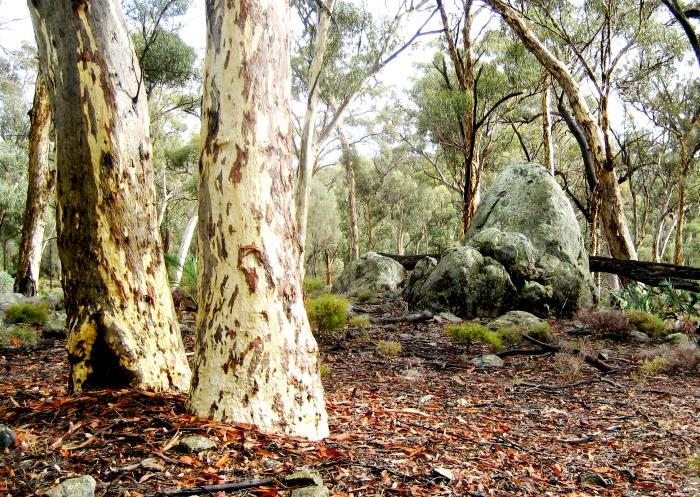 “In the country it is as if every tree said to me, ‘Holy! Holy!’ Who can ever express the ecstasy of the woods. O, the sweet stillness of the woods!” – Ludwig van Beethoven (1770-1827), German romantic composer; July 1814, note on visit to Baden.
“In the country it is as if every tree said to me, ‘Holy! Holy!’ Who can ever express the ecstasy of the woods. O, the sweet stillness of the woods!” – Ludwig van Beethoven (1770-1827), German romantic composer; July 1814, note on visit to Baden.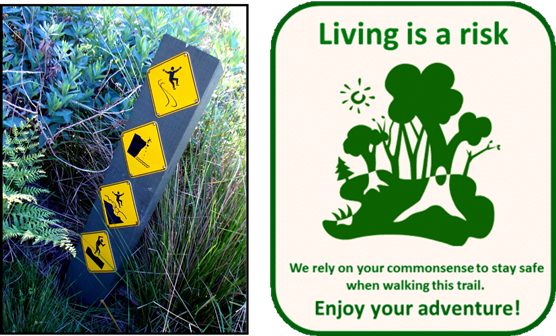 “The more that’s done for hikers in the forests and woods and mountains, in that far do they fail to get the most out of it… We must retain the challenging character of the wilderness.” – Walter O’Kane, American guidebook writer, 1935.
“The more that’s done for hikers in the forests and woods and mountains, in that far do they fail to get the most out of it… We must retain the challenging character of the wilderness.” – Walter O’Kane, American guidebook writer, 1935.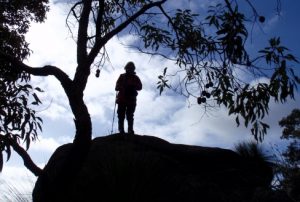 “Always in big woods, when you leave familiar ground and step off alone to a new place, there will be, along with feelings of curiosity and excitement, a little nagging of dread. It is the ancient fear of the unknown, and it is your bond with the wilderness you are going into. What you are doing is exploring. You are understanding the first experience, not of the place, but of yourself in that place. It is the experience of our essential loneliness, for nobody can discover the world for anybody else. It is only after we have discovered it for ourselves that it becomes common ground, and a common bond, and we cease to be alone.” – Wendell Berry (b. 1934), American writer & poet; The Unknown Wilderness: Kentucky’s Red River Gorge, 1971.
“Always in big woods, when you leave familiar ground and step off alone to a new place, there will be, along with feelings of curiosity and excitement, a little nagging of dread. It is the ancient fear of the unknown, and it is your bond with the wilderness you are going into. What you are doing is exploring. You are understanding the first experience, not of the place, but of yourself in that place. It is the experience of our essential loneliness, for nobody can discover the world for anybody else. It is only after we have discovered it for ourselves that it becomes common ground, and a common bond, and we cease to be alone.” – Wendell Berry (b. 1934), American writer & poet; The Unknown Wilderness: Kentucky’s Red River Gorge, 1971.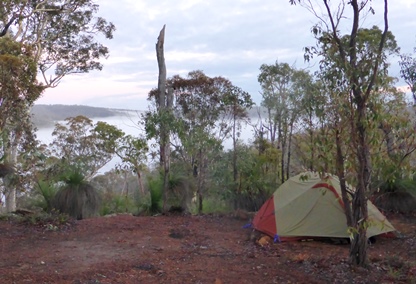 Designated Camping policy – For many bushwalkers, the most satisfying walking involves backpacking over a number of days and camping out, to become immersed in the ‘wilderness’ experience. However, camping is currently banned within most of the forested walk areas within the Perth region of Western Australia. Around 80% of the total traditional bushwalking areas close to Perth lie within the extensive water catchments of the Darling Range where camping for walkers is restricted to 15 designated campsites along the Bibbulmun Track between the Kalamunda Terminus and Dwellingup townsite. Within a larger part of these forest areas totalling around 4500 sq km, bushwalkers are therefore limited to day walks only. Unfortunately that will be the case for as long as current State regulations and policies remain unchanged. See also
Designated Camping policy – For many bushwalkers, the most satisfying walking involves backpacking over a number of days and camping out, to become immersed in the ‘wilderness’ experience. However, camping is currently banned within most of the forested walk areas within the Perth region of Western Australia. Around 80% of the total traditional bushwalking areas close to Perth lie within the extensive water catchments of the Darling Range where camping for walkers is restricted to 15 designated campsites along the Bibbulmun Track between the Kalamunda Terminus and Dwellingup townsite. Within a larger part of these forest areas totalling around 4500 sq km, bushwalkers are therefore limited to day walks only. Unfortunately that will be the case for as long as current State regulations and policies remain unchanged. See also 
 – No expensive equipment or amenities required and no (or minimal) fees.
– No expensive equipment or amenities required and no (or minimal) fees.